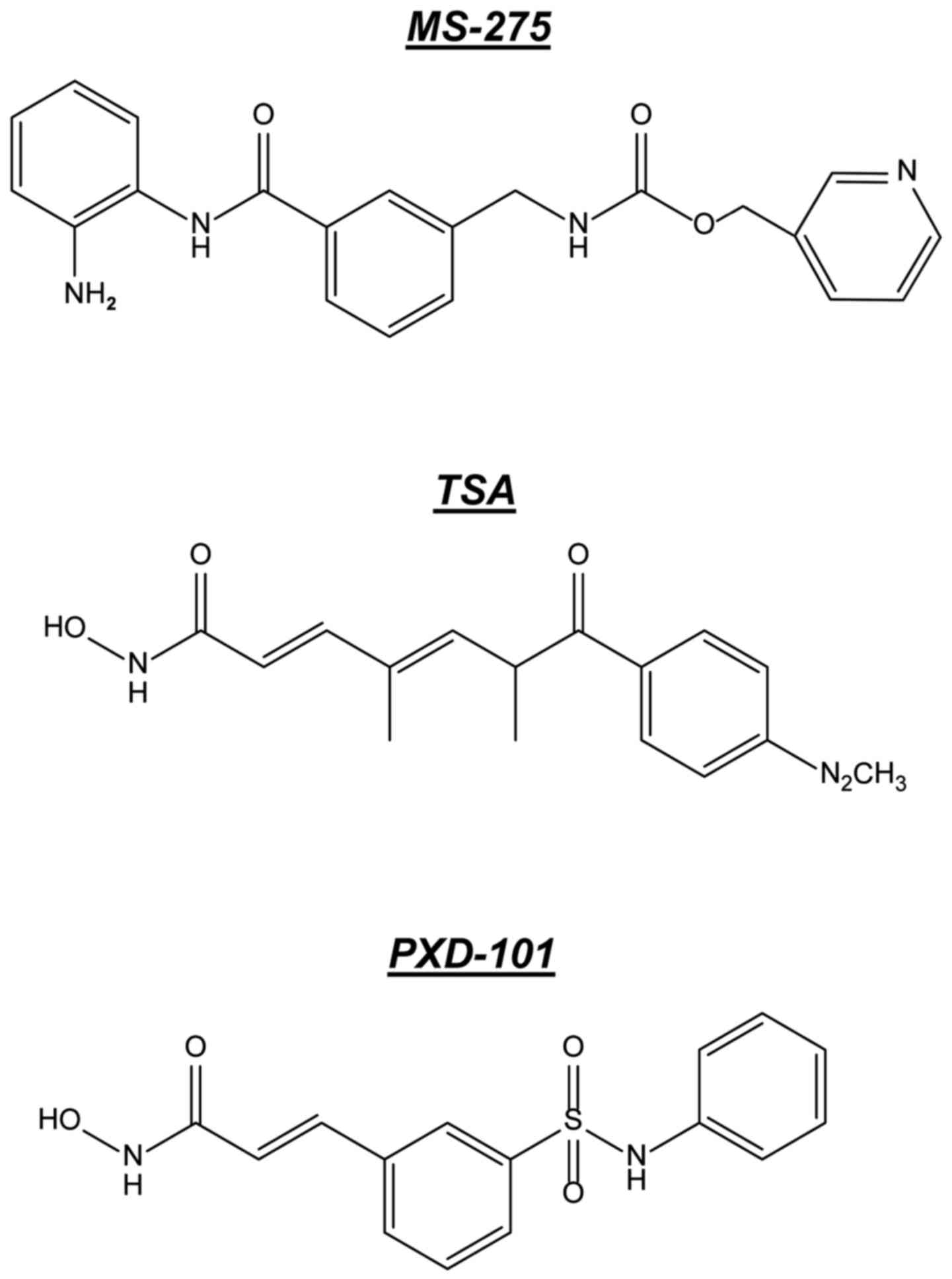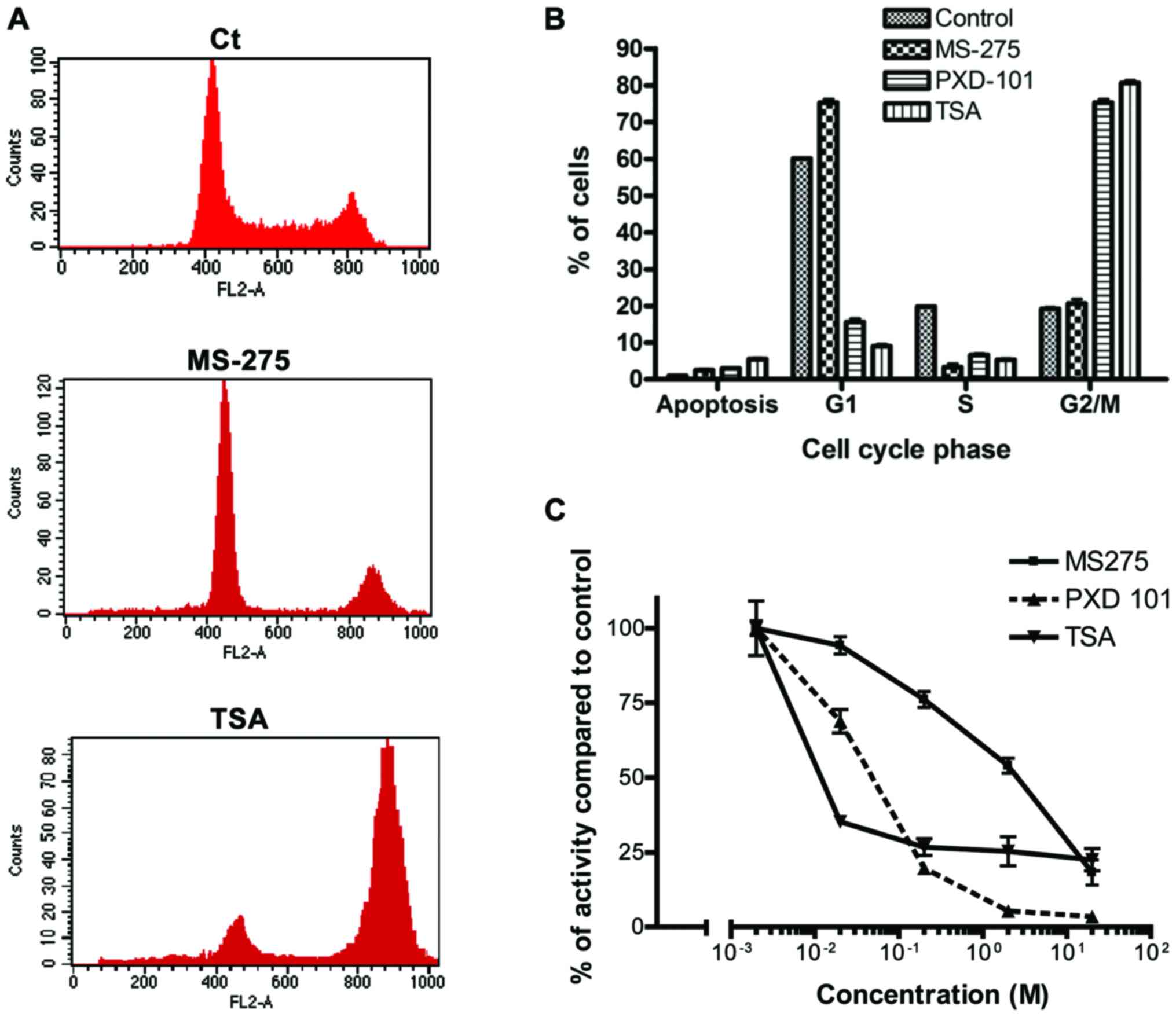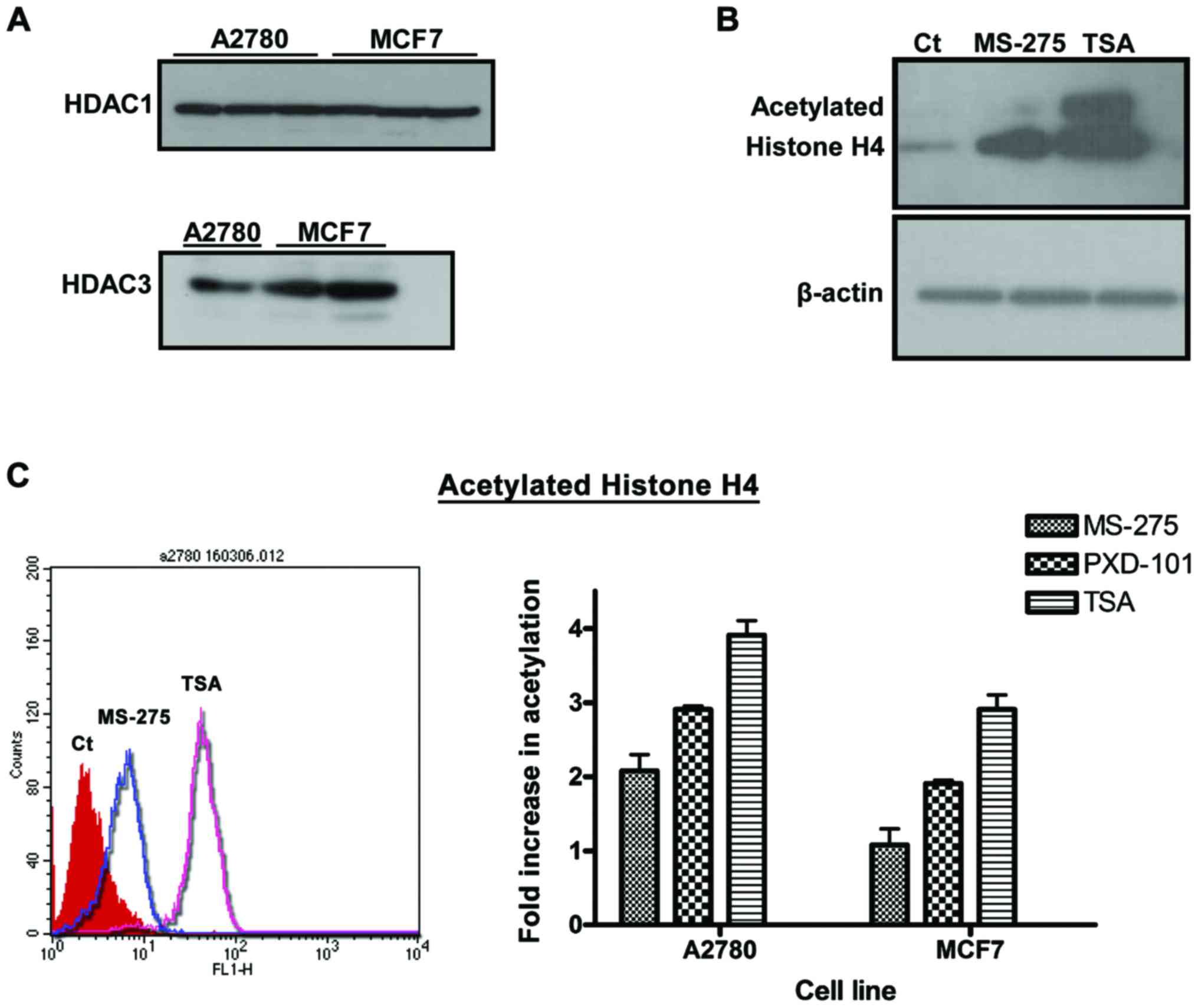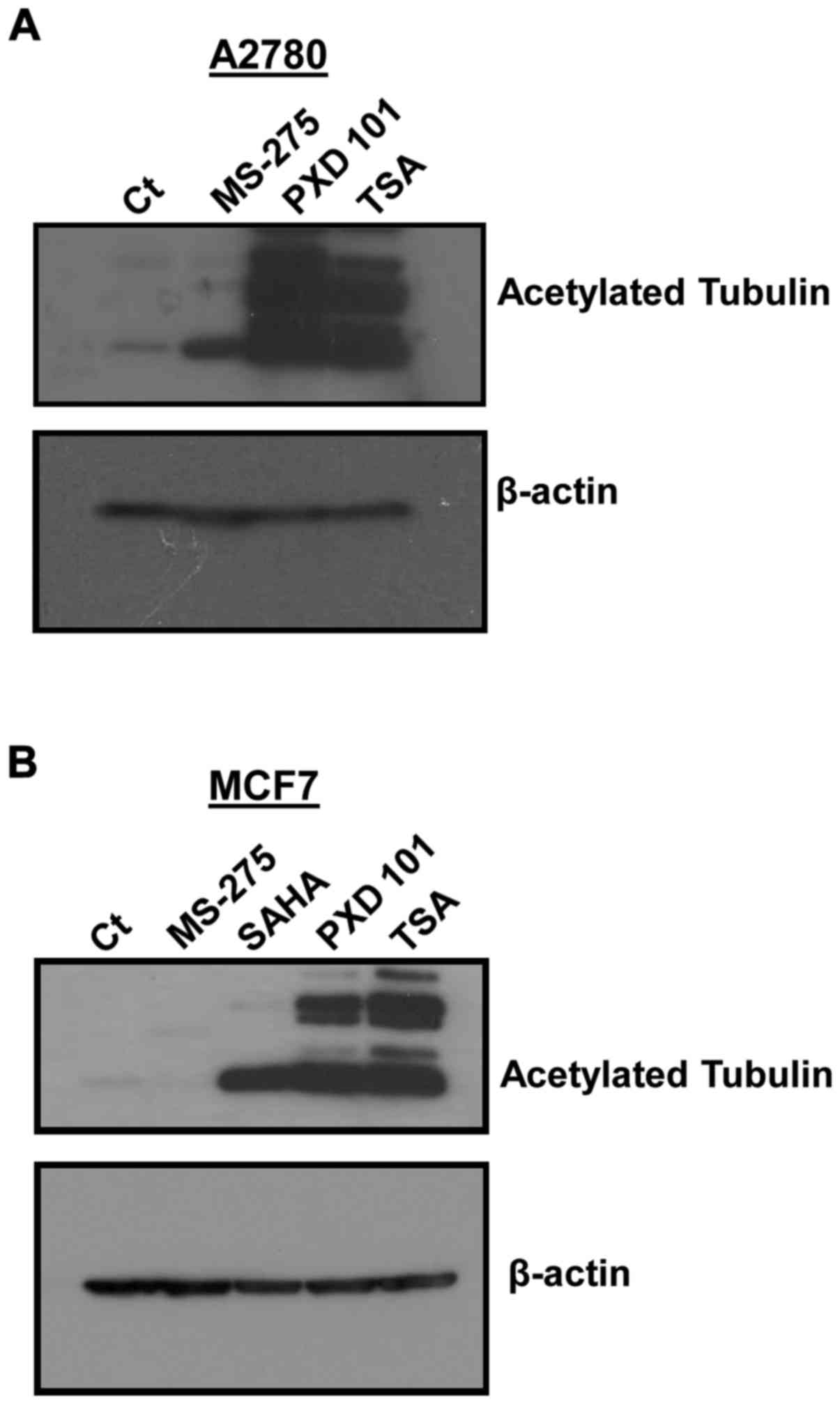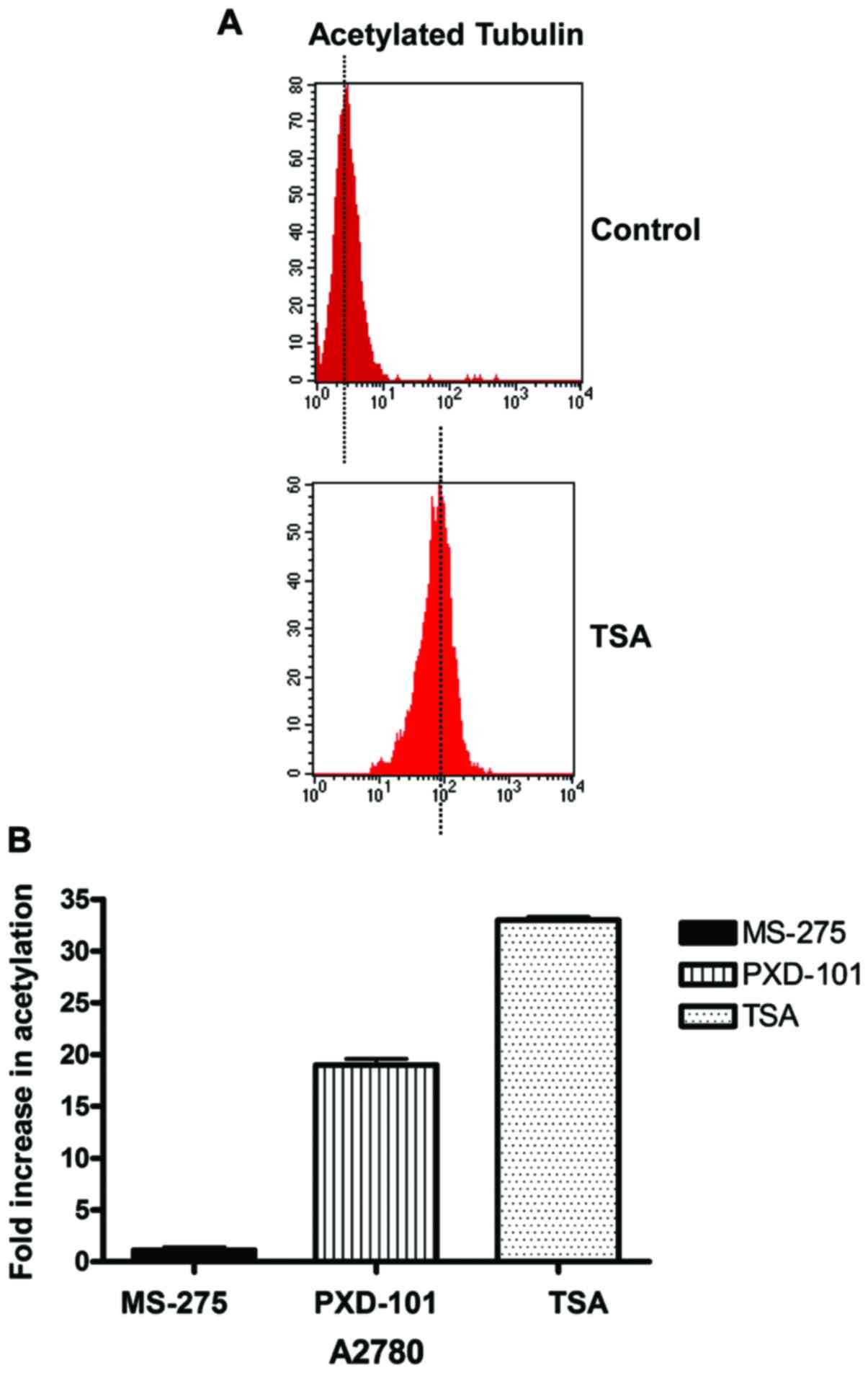|
1
|
Kristensen LS, Nielsen HM and Hansen LL:
Epigenetics and cancer treatment. Eur J Pharmacol. 625:131–142.
2009. View Article : Google Scholar : PubMed/NCBI
|
|
2
|
Witt O, Deubzer HE, Milde T and Oehme I:
HDAC family: What are the cancer relevant targets? Cancer Lett.
277:8–21. 2009. View Article : Google Scholar : PubMed/NCBI
|
|
3
|
Gray SG and Ekström TJ: The human histone
deacetylase family. Exp Cell Res. 262:75–83. 2001. View Article : Google Scholar : PubMed/NCBI
|
|
4
|
Mehnert JM and Kelly WK: Histone
deacetylase inhibitors: Biology and mechanism of action. Cancer J.
13:23–29. 2007. View Article : Google Scholar : PubMed/NCBI
|
|
5
|
Emanuele S, Lauricella M and Tesoriere G:
Histone deacetylase inhibitors: Apoptotic effects and clinical
implications (Review). Int J Oncol. 33:637–646. 2008.(Review).
PubMed/NCBI
|
|
6
|
Glaser KB: HDAC inhibitors: Clinical
update and mechanism-based potential. Biochem Pharmacol.
74:659–671. 2007. View Article : Google Scholar : PubMed/NCBI
|
|
7
|
Wilcox RA: Cutaneous T-cell lymphoma: 2016
update on diagnosis, risk-stratification, and management. Am J
Hematol. 91:151–165. 2016. View Article : Google Scholar : PubMed/NCBI
|
|
8
|
Hess-Stumpp H, Bracker TU, Henderson D and
Politz O: MS-275, a potent orally available inhibitor of histone
deacetylases-the development of an anticancer agent. Int J Biochem
Cell Biol. 39:1388–1405. 2007. View Article : Google Scholar : PubMed/NCBI
|
|
9
|
Tan J, Cang S, Ma Y, Petrillo RL and Liu
D: Novel histone deacetylase inhibitors in clinical trials as
anti-cancer agents. J Hematol Oncol. 3:52010. View Article : Google Scholar : PubMed/NCBI
|
|
10
|
O'Connor OA, Horwitz S, Masszi T, Van Hoof
A, Brown P, Doorduijn J, Hess G, Jurczak W, Knoblauch P, Chawla S,
et al: Belinostat in patients with relapsed or refractory
peripheral T-cell lymphoma: Results the pivotal phase II BELIEF
(CLN-19) study. J Clin Oncol. 33:2492–2499. 2015. View Article : Google Scholar : PubMed/NCBI
|
|
11
|
Batlevi CL, Kasamon Y, Bociek RG, Lee P,
Gore L, Copeland A, Sorensen R, Ordentlich P, Cruickshank S, Kunkel
L, et al: ENGAGE-501: Phase II study of entinostat (SNDX-275) in
relapsed and refractory Hodgkin lymphoma. Haematologica.
101:968–975. 2016. View Article : Google Scholar : PubMed/NCBI
|
|
12
|
Khan N, Jeffers M, Kumar S, Hackett C,
Boldog F, Khramtsov N, Qian X, Mills E, Berghs SC, Carey N, et al:
Determination of the class and isoform selectivity of
small-molecule histone deacetylase inhibitors. Biochem J.
409:581–589. 2008. View Article : Google Scholar : PubMed/NCBI
|
|
13
|
Boissinot M, Inman M, Hempshall A, James
SR, Gill JH, Selby P, Bowen DT, Grigg R and Cockerill PN: Induction
of differentiation and apoptosis in leukaemic cell lines by the
novel benzamide family histone deacetylase 2 and 3 inhibitor
MI-192. Leuk Res. 36:1304–1310. 2012. View Article : Google Scholar : PubMed/NCBI
|
|
14
|
Ronzoni S, Faretta M, Ballarini M, Pelicci
P and Minucci S: New method to detect histone acetylation levels by
flow cytometry. Cytometry A. 66:52–61. 2005. View Article : Google Scholar : PubMed/NCBI
|
|
15
|
Davies GF, Ross AR, Arnason TG, Juurlink
BH and Harkness TA: Troglitazone inhibits histone deacetylase
activity in breast cancer cells. Cancer Lett. 288:236–250. 2010.
View Article : Google Scholar : PubMed/NCBI
|
|
16
|
Takai N and Narahara H, Takai N and
Narahara H: Human endometrial and ovarian cancer cells: Histone
deacetylase inhibitors exhibit antiproliferative activity, potently
induce cell cycle arrest, and stimulate apoptosis. Curr Med Chem.
14:2548–2553. 2007. View Article : Google Scholar : PubMed/NCBI
|
|
17
|
Marquard L, Petersen KD, Persson M, Hoff
KD, Jensen PB and Sehested M: Monitoring the effect of belinostat
in solid tumors by H4 acetylation. APMIS. 116:382–392. 2008.
View Article : Google Scholar : PubMed/NCBI
|
|
18
|
Rigby L, Muscat A, Ashley D and Algar E:
Methods for the analysis of histone H3 and H4 acetylation in blood.
Epigenetics. 7:875–882. 2012. View Article : Google Scholar : PubMed/NCBI
|
|
19
|
Duong V, Bret C, Altucci L, Mai A,
Duraffourd C, Loubersac J, Harmand PO, Bonnet S, Valente S,
Maudelonde T, et al: Specific activity of class II histone
deacetylases in human breast cancer cells. Mol Cancer Res.
6:1908–1919. 2008. View Article : Google Scholar : PubMed/NCBI
|
|
20
|
Dejligbjerg M, Grauslund M, Litman T,
Collins L, Qian X, Jeffers M, Lichenstein H, Jensen PB and Sehested
M: Differential effects of class I isoform histone deacetylase
depletion and enzymatic inhibition by belinostat or valproic acid
in HeLa cells. Mol Cancer. 7:702008. View Article : Google Scholar : PubMed/NCBI
|
|
21
|
Baradari V, Huether A, Höpfner M, Schuppan
D and Scherübl H: Antiproliferative and proapoptotic effects of
histone deacetylase inhibitors on gastrointestinal neuroendocrine
tumor cells. Endocr Relat Cancer. 13:1237–1250. 2006. View Article : Google Scholar : PubMed/NCBI
|
|
22
|
Qian X, LaRochelle WJ, Ara G, Wu F,
Petersen KD, Thougaard A, Sehested M, Lichenstein HS and Jeffers M:
Activity of PXD101, a histone deacetylase inhibitor, in preclinical
ovarian cancer studies. Mol Cancer Ther. 5:2086–2095. 2006.
View Article : Google Scholar : PubMed/NCBI
|
|
23
|
Arts J, Angibaud P, Mariën A, Floren W,
Janssens B, King P, van Dun J, Janssen L, Geerts T, Tuman RW, et
al: R306465 is a novel potent inhibitor of class I histone
deacetylases with broad-spectrum antitumoral activity against solid
and haematological malignancies. Br J Cancer. 97:1344–1353. 2007.
View Article : Google Scholar : PubMed/NCBI
|
|
24
|
Strait KA, Dabbas B, Hammond EH, Warnick
CT, Iistrup SJ and Ford CD: Cell cycle blockade and differentiation
of ovarian cancer cells by the histone deacetylase inhibitor
trichostatin A are associated with changes in p21, Rb, and Id
proteins. Mol Cancer Ther. 1:1181–1190. 2002.PubMed/NCBI
|
|
25
|
Strait KA, Warnick CT, Ford CD, Dabbas B,
Hammond EH and Ilstrup SJ: Histone deacetylase inhibitors induce
G2-checkpoint arrest and apoptosis in cisplatinum-resistant ovarian
cancer cells associated with overexpression of the Bcl-2-related
protein Bad. Mol Cancer Ther. 4:603–611. 2005. View Article : Google Scholar : PubMed/NCBI
|
|
26
|
Liu T, Kuljaca S, Tee A and Marshall GM:
Histone deacetylase inhibitors: Multifunctional anticancer agents.
Cancer Treat Rev. 32:157–165. 2006. View Article : Google Scholar : PubMed/NCBI
|
|
27
|
Hong S, Derfoul A, Pereira-Mouries L and
Hall DJ: A novel domain in histone deacetylase 1 and 2 mediates
repression of cartilage-specific genes in human chondrocytes. FASEB
J. 23:3539–3552. 2009. View Article : Google Scholar : PubMed/NCBI
|
|
28
|
Chandrasekaran S, Peterson RE, Mani SK,
Addy B, Buchholz AL, Xu L, Thiyagarajan T, Kasiganesan H, Kern CB
and Menick DR: Histone deacetylases facilitate sodium/calcium
exchanger up-regulation in adult cardiomyocytes. FASEB J.
23:3851–3864. 2009. View Article : Google Scholar : PubMed/NCBI
|















